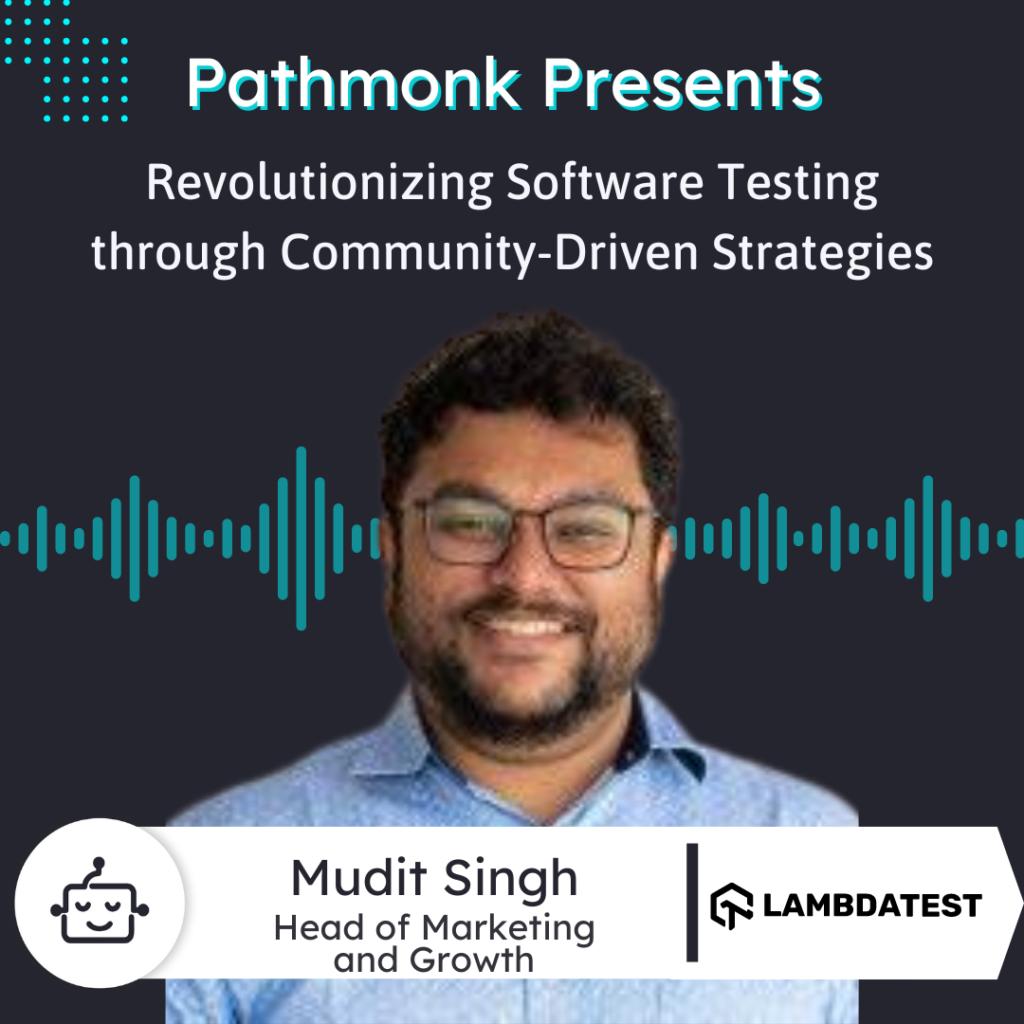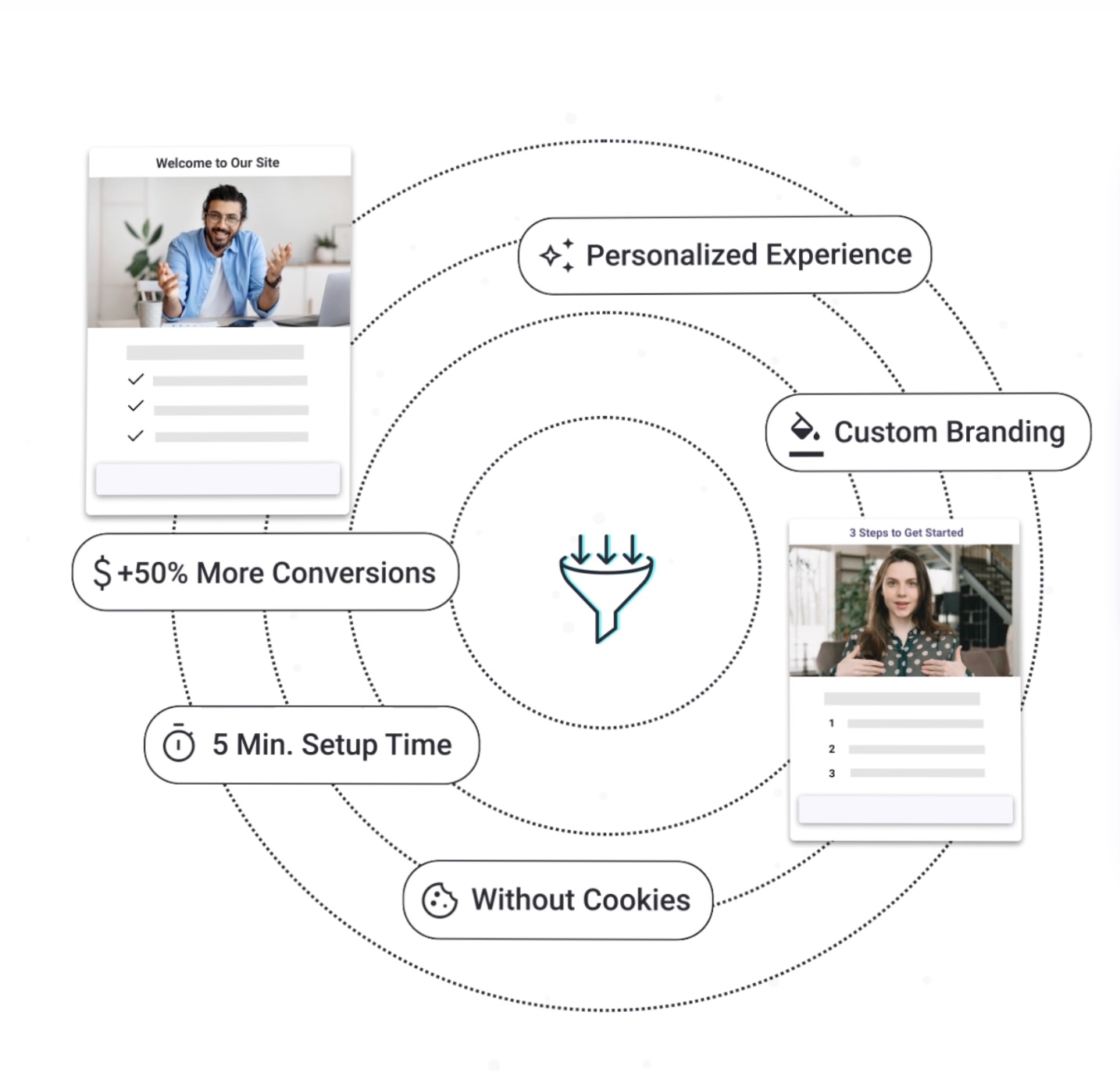
Introduction
In the latest episode of Pathmonk Presents, we had the pleasure of hosting Mudit Singh, who currently serves as the Head of Marketing and Growth at LambdaTest.
Lambda Test is a prominent test orchestration and execution platform. During the episode, Mudit provided a wealth of valuable insights into how Lambda Test is revolutionizing the way developers and testers conduct tests at scale. He delved into the platform’s role in accelerating development pipelines and ensuring high application quality through a community-driven approach.
Gain valuable insights into the transformative potential of testing automation and quality engineering, and learn how strategic marketing plays a crucial role in driving LambdaTest’s growth.
More Sales From Your Website With AI
Personalized interactions based on your users' behaviour to get +50% more conversions.

Ernesto Quezada: Pathmonk is the intelligent tool for website lead generation. With increasing online competition, over 98% of website visitors don’t convert. The ability to successfully show your value proposition and support visitors in their buying journey separates you from the competition. Online, Pathmonk qualifies and converts leads on your website by figuring out where they are in the buying journey and influencing them in key decision moments with relevant micro experiences like case studies, intro videos, and much more. Stay relevant to your visitors and increase conversions by 50%. Add Pathmonk to your website in seconds. Let the AI do all the work and get access to 50% more qualified leads while you keep doing marketing and sales as usual. Check us out on pathmonk.com. Welcome to today’s episode. Let’s talk about today’s guest. We have Mudit Singh from LambdaTest, Head of Marketing and Growth. How are you doing today, Mudit?
Mudit: Hey Ernesto, doing really good and thank you for hosting me. Really honored to be part of the podcast.
Ernesto: It’s great to have you on. Someone with your experience and also having Lambda Test on here is a privilege for us. Well, first off, let’s give why the listeners are tuning in and tell us in your own words, what is LambdaTest all about?
Mudit: Awesome. LambdaTest is a test orchestration and execution platform. What we provide is an online platform infrastructure and tooling in place that helps you execute tests at scale, any type of test, any type of programming language framework, operating system that you want to run your test on. We have the tooling and infrastructure in place to help you run those tests and run those tests faster than anything you can imagine.
Ernesto: Great to hear that. So that way our listeners can get a good understanding of your company, you mentioned that testing is the primary course. Is there another key problem that you like to solve for your clients?
Mudit: We help in what we call developer feedback time and helping you release faster. One of the biggest bottlenecks in running any type of software development pipeline is the testing part. Imagine this, everybody is talking about agile development methodology today, right? What that means is we focus on small feature sets at a time. A developer develops one feature, a designer designs one feature, DevOps guys deploy one feature, but the testers have to test the whole application, not just one feature. As those sprints and features start stacking up, the timeframe in which that tester has to test that specific feature becomes a big problem. Testing the whole application becomes a challenge, especially when people have to move very fast. Testing usually becomes a bottleneck in the pipeline. There are ways people have been solving that, like automation, but even then, the biggest challenge is scaling the automation testing features. The infrastructure or the right tooling in place to help them succeed becomes the problem. That’s the problem we have been solving: helping you fix that bottleneck, run your tests at a fast speed, and ensure that your overall development pipeline is smoothly flowing. We also provide a lot of tooling in place that enables you to debug and release faster. It’s not just testing infrastructure; it’s a lot of tooling over the top that can help you debug, get a complete quality check of your application, understand the health of your application, and get a lot of dashboards and graphs.
Ernesto: Great to hear that. As far as your clients, who would be using Lambda Test? Is there a certain vertical segment? Is there an ideal ICP for LambdaTest?
Mudit: The great part about the LambdaTest platform is that it’s industry agnostic. Anybody with a big digital presence would need a platform like ours. We have clients from fintech, other software-as-a-service platforms, publishers, retail, e-commerce, healthcare—nearly every industry vertical. It’s also about scale. We have clients giving us $180 a year all the way to millions of dollars a year based on their scale. We have nearly 2 million developers and testers using the platform, ranging from freelancers to Fortune 500 and Fortune 200 companies.
Ernesto: Great to hear that. How would someone usually find out about LambdaTest? Is there a top client acquisition channel?
Mudit: We’ve been in business for about six and a half, seven years. One of the most important factors for us has always been to focus on the customer. Customer obsession is very important for us. Because of that, we have been growing rapidly, very fast, for the last nearly three and a half, four years, since we launched our first release, through organic channels. That includes community development, organic search, and referrals. The biggest channel for us has been building a community ecosystem. That connects with many different marketing concepts like SEO, social media, and content marketing. We started by creating content to help our users in their automation or testing journey—tutorials, long-form tutorials, in-depth tech tutorials. We ensured our product pages were focused on features, helping users get started quickly. Our onboarding cycle is very precise. Product was a very important part of things. When we look back, it’s what we now call product-led growth. At that time, we didn’t know the term. We focused on the product and ensuring the ecosystem provided the right information to users to get started and scale up. All of that brought us a lot of web traffic through SEO and search engines. We doubled down on that, created more posts that were working for us, and connected with customers to get feedback. We built a community ecosystem. We connected with freelance developers, testers, and programmers to help us write content. We have nearly 45-50 community members helping us create content in video and textual formats. We built programs to further enable people, like free online video courses, partnering with platforms like LinkedIn, Coursera, and Udemy. We have a certification program where our customer success team and marketing team manually check each submission. Our flagship event is Test New Conference, an online event every August with over 18,000 attendees. We plan to make it bigger, with 40+ community members speaking. So, everything we do helps build the community, accelerate knowledge in testing, and roadmap the Lambda Test product itself.
Ernesto: Awesome. For our listeners tuned in, they can visit you at lambdatest.com. What role does the website play in client acquisition?
Mudit: For us, the most important aspect for anyone coming to Lambda Test’s website is understanding the features we have and the problems we solve. Our ICP includes developers, testers, and programmers with specific use cases. When they land on our page, they should get the solution to their problem immediately. The information should be accessible in a bite-sized manner. The webpage represents the company and the product, talking in the same language as the potential user.
Ernesto: Great. Let’s switch gears a bit and talk about you as a leader, Mudit. As the Head of Marketing and Growth at LambdaTest, what are some key tasks you focus on in your day-to-day work?
Mudit: For me, it’s important to understand the daily tasks and processes happening in the team. I look at dashboards and data, checking metrics and strategizing the next steps. My KPIs include having more users and revenue, so I track signups, activation, visits, and how many continue running tests. The overall metric is the health of the funnel and how we can scale it up. There are long-term strategies and short-term tweaks to improve messaging and presentation.
Ernesto: Great to hear that. Let’s jump into our next section, Mudit, which is the rapid-fire question round. Are you ready for them?
Mudit: Yeah, sure.
Ernesto: First off, what is the last book you read?
Mudit: The last book I read was “An Analytical Marketer” by Adele Sweetwood. It’s about how to create an analytic strategy for a marketing platform. It helped me understand KPIs and how to map out and track overall marketing strategy.
Ernesto: Great read. If there were no boundaries in technology, what would be the one thing you want to have fixed for your role as a marketer today?
Mudit: The content generation part. We often create content with the audience in mind, but it doesn’t always resonate. I’d like to create content that resonates well with a very niche group of people rather than a broad audience.
Ernesto: If there is one repetitive task you could automate, what would that be?
Mudit: Sending reports. We capture a lot of different metrics across different tools and have to dig down and hunt the data to understand what is happening and why. Stitching the data together to get the right answers is a problem I’d love to automate.
Ernesto: Everyone goes through that, so definitely something valuable to solve. With all your experience in marketing, what is one piece of advice you would give yourself if you were to restart your journey as a marketer today?
Mudit: Talk to the customers. Many marketers focus on tasks and forget about understanding the customer’s pain points. Being out there, talking to customers, and understanding their needs helps present your product as a solution better. Instead of starting with content strategies or SEO, first connect with as many customers as possible to understand their pain points.
Ernesto: Great advice for our listeners. We are coming to the end of the show today, but I want to give you the last word. If someone forgets everything about the interview today, what is the one thing they should remember about Lambda Test?
Mudit: We are a community-driven test platform focused on quality engineering. Remember our Test New conference, where you can get insights on the latest in quality engineering.
Ernesto: You can check them out at lambdatest.com. Thank you for being on with us today, Mudit, and to our listeners for tuning in. Looking forward to our next episode at Pathmonk Presents. Thanks a lot.
Mudit: Thanks for having me, Ernesto. Really great to be here.



